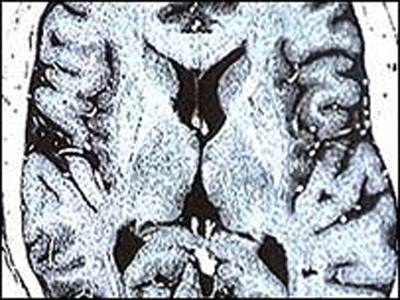January 29, 2008
Soul Shards

I have just received a copy of Douglas Hofstadter's "I Am A Strange Loop". A couple of excerpts:
And another:The Mirage One day when I was around sixteen or seventeen, musing intensely on these swirling clouds of ideas that gripped me emotionally no less than intellectually, it dawned on me -- and it as ever since seemed to me -- that what we call "consciousness" was a kind of mirage. It had to be a very peculiar type of mirage, to be sure, since it was a mirage that perceived itself, and of course it didn't believe that it was perceiving a mirage, but no matter -- it still was a mirage. It was almost as if this slippery phenomenon called "consciousness" lifted itself up by its own bootstraps, almost as if it made itself out of nothing whenever one looked more closely.
Collectors who buy art objects are missing the point. Better to be collecting artists instead. That's where the true value of the art object comes from.Soul Shards One gloomy day in early 1991, a couple of months after my father died, I was standing in the kitchen of my parents' house, and my mother, looking at a sweet and touching photograph of my father taken perhaps fifteen years earlier, said to me, with a note of despair, "What meaning does that photograph have? None at all. It's just a flat piece of paper with dark spots on it here and there. It's useless." The bleakness of my mother's grief-drenched remark set my head spinning because I knew instinctively that I disagreed with her, but I didn't know how to express to her the way I felt the photograph should be considered.After a few minutes of emotional pondering -- soul searching, quite literally -- I hit upon an analogy that I felt could convey to my mother my point of view, and which I hoped might lend her at least a tiny degree of consolation. What I said to her was along the following lines.
'In the living room we have a book of the Chopin ?tudes for piano. All of its pages are just pieces of paper with dark marks on them, just as two dimensional and flat and foldable as the photograph of Dad -- and yet, think of the powerful effect that they have had on people all over the world for 150 years now. Thanks to those black marks on those flat sheet of paper, untold thousands of people have collectively spent millions of hours moving their fingers over the keyboards of pianos in complicated patterns, producing sounds that give them indescribable pleasure and a sense of great meaning. Those pianists in turn have conveyed to many millions of listeners, including you and me, the profound emotions that churned in Fr?d?ric Chopin's heart, thus affrding all of us some partial access to Chopin's interiority -- to the experience of living in the head, or rather the soul of Fr?d?ric Chopin. The marks on those sheets of paper are no less than soul-shards -- scattered remnants of the shattered soul of Fr?d?ric Chopin. Each of those fragments have the power to bring back to life, inside our brains, some tiny fragment of the internal experiences of a human being -- his sufferings, his joys, his deepest passions and tensions -- and we thereby know at least in part, what it was like to be that human being...
*
*
*
(All this soul talk, maudlin stuff... pues, nada.)
Post Script:
Up against all of this soulful talk, check this out:
Owens' larger concern seems to be an anxiety about authenticity. Are you the real you? But what is the real you? Were you, you, when you 10 years old? 20? 45? Were you the real you before you had graduated college? Were married? Were a parent? Were you more real when you were shy before you "came out of your shell" after joining the basketball or debate team? Are you the real you when you drink coffee to boost your concentration in order to finish that new sales report? Or are the real you when you take Viagra to boost your sexual performance? Turn the question around: are people who choose to use Viagra, cosmetic surgery, hair-coloring, propranolol to overcome stage fright, fakes? A strong case can be made that people who take advantage modern technologies are seeking to become more authentically who they believe themselves to be. Demands for authenticity turn out to be just a way for other people to impose their views of your proper social status on you.Posted by Dennis at January 29, 2008 4:16 PM
Owens concludes that religious "beliefs may all be delusions but, as technology advances, the need for such fixed points becomes more, not less pressing." However, as we've seen, such "fixed points" don't really exist. Owens wants to liken the human journey to following the signposts of a well-marked Rand-McNally atlas. Instead, humanity is a team of explorers who constantly push forward into undiscovered territories. With many false starts and dead ends, we chart the map of the future as we go along. Like all analogies, the map analogy is inexact?we not only make the map, we also create the landscape of human possibilities through which we travel.
Leave a comment